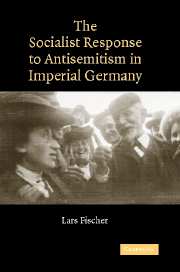Book contents
- Frontmatter
- Contents
- Preface
- Acknowledgements
- Acronyms
- Introduction
- 1 Social Democracy's Stance on Antisemitism and the Spectre of ‘Philosemitism’
- 2 The Influence of ‘Zur Judenfrage’ on the Socialist Movement
- 3 The Socialist Uses and Abuses of ‘Zur Judenfrage’
- 4 The Social Democratic Party Congress of 1903 and the Case of Hans Leuß
- 5 The Former Antisemite Leuß on Antisemitism and ‘the Jewish Question’
- 6 Antisemitism and ‘the Jewish Question’ in Dresden
- 7 The Evolution of Bernstein's Stance on Antisemitism and ‘the Jewish Question’
- Conclusion
- Select bibliography
- Index
6 - Antisemitism and ‘the Jewish Question’ in Dresden
Published online by Cambridge University Press: 15 December 2009
- Frontmatter
- Contents
- Preface
- Acknowledgements
- Acronyms
- Introduction
- 1 Social Democracy's Stance on Antisemitism and the Spectre of ‘Philosemitism’
- 2 The Influence of ‘Zur Judenfrage’ on the Socialist Movement
- 3 The Socialist Uses and Abuses of ‘Zur Judenfrage’
- 4 The Social Democratic Party Congress of 1903 and the Case of Hans Leuß
- 5 The Former Antisemite Leuß on Antisemitism and ‘the Jewish Question’
- 6 Antisemitism and ‘the Jewish Question’ in Dresden
- 7 The Evolution of Bernstein's Stance on Antisemitism and ‘the Jewish Question’
- Conclusion
- Select bibliography
- Index
Summary
Perceptions and prescriptions regarding ‘the Jews’ may have been irrelevant to the way in which the delegates at the Congress in Dresden judged the former antisemite, Hans Leuß, but they were by no means absent from the debate. In this chapter, I will discuss four relevant issues that did feature in Dresden: Harden's Jewish origin, Wilhelm Liebknecht's infamous critique of the Dreyfusards, the decision of the Party Congress of 1892 to postpone its debate on antisemitism and, finally, Mehring's idiosyncrasies in this field. As we will see, these issues were brought up in a casual and unsophisticated manner, yet failed to precipitate any sort of critical response from the delegates. This not only makes it inconceivable that the delegates should at the same time have been anything other than at best indifferent to Leuß's relevant notions. It also throws that indifference all the more sharply into relief. Casual, often almost unconscious, allusions to antisemitism and ‘the Jews’ spontaneously sprang to mind in virtually any situation – except when it really mattered. When assessing the merits of a former antisemite, for example, all interest in these issues mysteriously disappeared.
HARDEN'S JEWISH BACKGROUND
Throughout his speech in Mehring's defence, Bebel persistently referred to Harden as Wittkowski-Harden (sic!). This was a reference to Harden's birth name, Felix Ernst Witkowski, or rather, to the fact that Harden was not his birth name. Prima facie, this reference seems innocent enough. Bebel explained that he had only recently become aware of Harden.
- Type
- Chapter
- Information
- The Socialist Response to Antisemitism in Imperial Germany , pp. 149 - 172Publisher: Cambridge University PressPrint publication year: 2007



